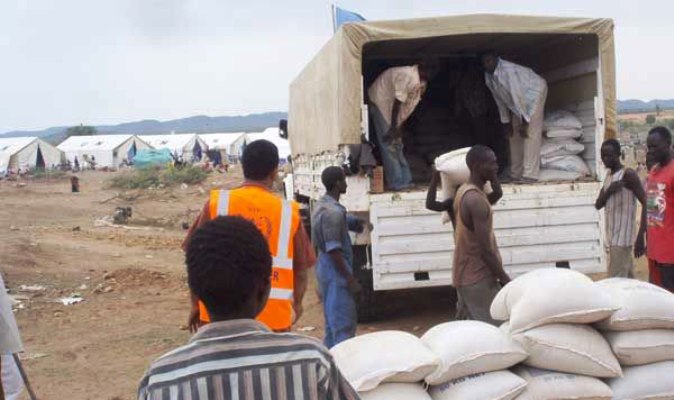UN hails Sudan’s decision to allow humanitarian access to Two Areas

October 2, 2018 (NEW YORK) – The UN Under-Secretary-General for Humanitarian Affairs and Emergency Relief Coordinator Mark Lowcock has praised Sudan’s decision to allow humanitarian access to rebel-held areas in South Kordofan and Blue Nile states.
The Sudanese army has been fighting the Sudan People’s Liberation Movement/North (SPLM-N) rebels in the Blue Nile and South Kordofan, also known as the Two Areas since 2011.
Last week, the Sudanese government said it has accepted a proposal from the UN to deliver humanitarian aid to rebel-held areas in the Two Areas from inside Sudan.
Sudan’s Humanitarian Aid Commissioner Ahmed Mohamed Adam Tuesday told Sudan Tribune that he met with Lowcock on Monday in New York.
He pointed out that the UN official described Sudan’s decision as a positive move towards improving the humanitarian situation in the Two Areas.
Adam added he briefed Lowcock on the latest political and humanitarian developments in Sudan and the need to make concerted efforts among the government, the UN and other partners in order to promote peace and stability and to move from emergency relief to reconstruction and development.
According to Adam, the UN official expressed his conviction that humanitarian situation has improved and announced his support to government efforts in this regard.
He also urged donors to increase funding in order to contribute to enhancing the stability and resilience of affected communities.
Meanwhile, the UN Resident and Humanitarian Coordinator in Sudan, Gwi-Yeop Son, has welcomed Sudan’s decision to accept her request to facilitate humanitarian access to the affected population in the rebel-held areas.
“The request is purely humanitarian in nature and is based on humanitarian imperatives. The UN’s relief operations will adhere to the humanitarian principles of neutrality and impartiality” she wrote in a letter to the Sudanese government
Son stressed the UN would monitor the delivery of humanitarian assistance, calling on all parties to facilitate humanitarian access and the delivery of assistance to the most vulnerable people in the Two Areas.
Talks between the Sudanese government and the SPLM-N for a cessation of hostilities and humanitarian access are stalled since August 2016.
The SPLM-N demands to deliver 20% of the humanitarian assistance through a humanitarian corridor from Asosa, an Ethiopian border town.
But the government rejects the idea saying it is a breach of the state sovereignty and a manoeuvre from the rebels to bring arms and ammunition to their locked rebel-held areas in the Two Areas.
The SPLM-N, in November 2016 declined an American proposal to transport humanitarian medical assistance directly to the civilians in the rebel-held areas in the Blue Nile and South Kordofan.
Also, during the last round of talks from 1 to 3 February, the Sudanese government and SPLM-N al-Hilu failed to reach a cessation of hostilities agreement.
The mediation delinked the ceasefire and the humanitarian access and focused at this round only on the cessation of hostilities agreement.
However, differences between the sides emerged when Khartoum proposed that the cessation of hostilities be a step towards a permanent ceasefire and humanitarian access.
(ST)
